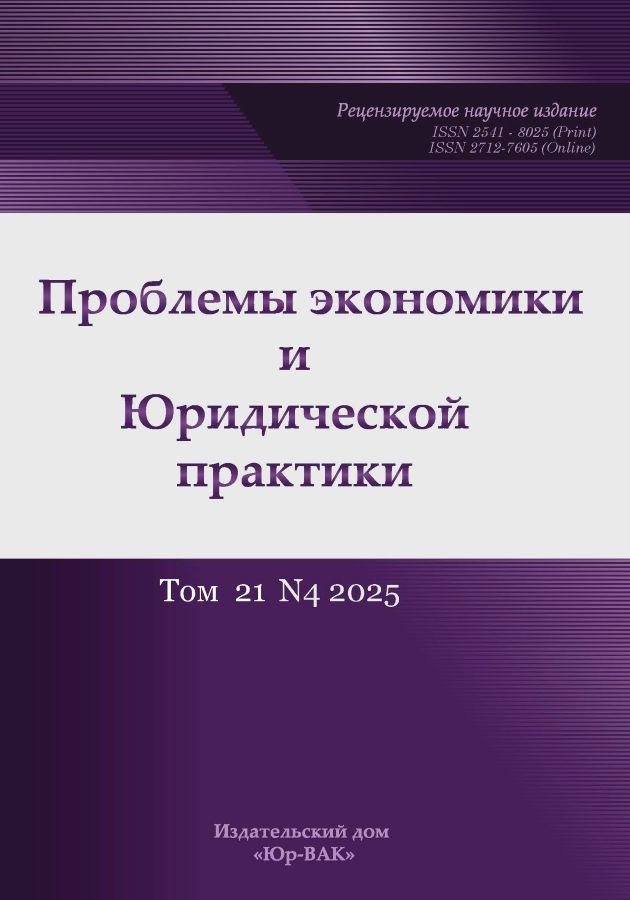On the issue of industrial production intellectualization process in Russia
- Authors: Kapranova L.D.1, Abrosimova O.M.1
-
Affiliations:
- Financial University under the Government of the Russian Federation
- Issue: Vol 21, No 4 (2025)
- Pages: 173-182
- Section: Regional and Sectoral Economics
- URL: https://journals.eco-vector.com/2541-8025/article/view/691597
- DOI: https://doi.org/10.33693/2541-8025-2025-21-4-173-182
- EDN: https://elibrary.ru/HMWZOY
- ID: 691597
Cite item
Abstract
The article examines the problems of industrial production intellectualization as a basic component for achieving technological sovereignty of Russia, which will allow achieving technological leadership in the world market. Particular attention is paid to the factors hindering the process of industrial intellectualization, among which are: insufficient maturity of IT products, low level of industrial automation. It is noted that the process of digital transformation of Russian organizations is not yet systemic, since there is no «digital maturity» of industry, which is a step-by-step process of transformations in industrial production based on its automation, then robotization, and at the third stage—already on the basis of intelligent superstructures of production management based on artificial intelligence. It is emphasized that the intellectualization of industrial production, its active stage begins with the beginning of the use of artificial intelligence in making management decisions. The purpose of the work: to analyze the process of industrial intellectualization and the dependence of industrial development on scientific and technological potential. The problems of industrial intellectualization are considered from the position of integration of scientific, technical and industrial spheres of the Russian economy. The theoretical basis of the scientific work was the use of general scientific methods of cognition to the processes under study, and the use of a logical approach made it possible to interpret the results obtained in the work for conclusions and formulate some proposals for the interaction of scientific, technical and industrial spheres of the real economy. It is concluded that Russia has resources and opportunities for the intellectualization of industrial production in order to achieve technological sovereignty and improve the efficiency of industry, which meet the goals of the Strategy for Scientific and Technological Development of the Russian Federation.
Full Text
About the authors
Lyudmila D. Kapranova
Financial University under the Government of the Russian Federation
Author for correspondence.
Email: LKapranova@fa.ru
ORCID iD: 0000-0001-9130-1252
SPIN-code: 1874-9887
Cand. Sci. (Econ.), Associate Professor of the Department of Corporate Finance and Corporate Governance
Russian Federation, MoscowOlga M. Abrosimova
Financial University under the Government of the Russian Federation
Email: Omabrosimova@fa.ru
ORCID iD: 0000-0002-8889-0989
SPIN-code: 9437-5576
Junior Researcher, Institute of Financial and Industrial Policy
Russian Federation, MoscowReferences
- Zelentsova L.S., Ukolov V.F., Tikhonov A.I. Development of intellectualization of Russian industry: A strategic approach. Management. 2023. Vol. 11. No. 4. Pp. 17–24. doi: 10.26425/2309-3633-2023-11-4-17-24. URL: https://cyberleninka.ru/article/n/razvitie-intellektualizatsii-promyshlennosti-rossii-strategicheskiy-podhod.
- Afanasyev A.A. Digital transformation of Russian mechanical engineering in the context of the fourth industrial revolution. Issues of Innovation Economics. 2024. Vol. 14. No. 1. Pp. 221–240. doi: 10.18334/vinec. 14.1.120242. URL: https://e-cis.info/upload/iblock/b97/1bg1ocuv0c5t5qj2dujxozm2alu8fkei.pdf.
- Afanasyev A.A. Digitalization of industry: theoretical foundations and research methodology. Economy, Entrepreneurship and Law. 2023. No. 8. Pp. 2537–2556. doi: 10.18334/epp.13.8.118634. URL: https://1economic.ru/lib/118634.
- Gritskikh N.V., Kononova O.N., Rybak N.S. Development of creative industries in the context of digitalization. Sociology. 2022. No. 6. Pp. 39–47. URL: https://cyberleninka.ru/article/n/razvitie-kreativnyh-industriy-v-usloviyah-tsifrovizatsii/viewer (date of access 12.08.2025).
- Korovkin V.V., Kuznetsova G.V. Prospects for the digital transformation of Russian mechanical engineering. Administrative Management. 2020. Vol. 12. No. 2. Pp. 291–313. URL: https://doi.org/10.17072/2218-9173-2020-2-291-313.
- Tebekin A.V., Tebekin P.A., Egorova A.A. Analysis of the prospects for the development of the national economy with the introduction of end-to-end digital technologies. Journal of Economic Research. 2020. Vol. 6. No. 4. Pp. 3−18. URL: https://naukaru.ru/ru/nauka/article/40501/view.
- Niyazova Yu.M., Garin A.V., Zlydnev M.I. Digital platform as an information and economic structure. Competence. 2021. No. 1. doi: 10.24411/1993-8780-2021-10105. URL: file:///C:/Users/Людмила/Downloads/tsifrovaya-platforma-kak-informatsionno-ekonomicheskaya-struktura%20(1).pdf.
- Digital transformation of industry: trends, management, strategies: collection of scientific articles / ed. Corresponding Member of the Russian Academy of Sciences, Doctor of Economics, Professor V. V. Akberdina. Ekaterinburg: Institute of Economics, Ural Branch of the Russian Academy of Sciences, 2024. Electronic. text. data. (3.18 MB). 377 p. URL: https://uiec.ru/wp-content/uploads/2025/04/DTI-2024_el-1-1.pdf.
- Polozhikhina M.A. Regulation of the process of digitalization of the economy: European and Russian experience. Russia and the Modern World. 2018. Vol. 4., No. 10. Pp. 64–81. URL: https://cyberleninka.ru/article/n/regulirovanie-protsessa-tsifrovizatsii-ekonomiki-evropeyskiy-i-rossiyskiy-opyt/viewer.
- Volkov A.N., Muthanna A.S.A., Kucheryavy A.E. Fifth-generation communication networks: Towards 2030 networks. Information Technologies and Telecommunications. 2020. Vol. 8. No. 2. Pp. 32–43. doi: 10.31854/2307-1303-2020-8-2-32-43. https://www.sut.ru/doci/nauka/1AEA/ITT/2020_2/32-43.pdf.
- Alekseeva D.I., Selina O.V. Digital finance: How technologies are changing the financial sector and financial management methods. Bulletin of Science. 2024. No. 10 (79). Pp. 22–29. URL: https://www.vesnik-nauki.rf/article/17553.
- Dorzhieva V.V. Digitalization of Industry: The Role of Artificial Intelligence and Opportunities for Russia. Issues of Innovative Economics. 2022. Vol. 12. No. 4. Pp. 2383–2394. URL: https://www.elibrary.ru/item.asp?id=50211441.
- Samsonova M.V., Fedorishcheva O.V. Formation and Development of an Ecosystem in Industry. Issues of Economics and Law. 2023. No. 12 (186). Pp. 139–145. URL: https://cyberleninka.ru/article/n/formirovanie-promyshlennyh-ekosistem-kak-instrument-antikrizisnogo-upravleniya.
Supplementary files













